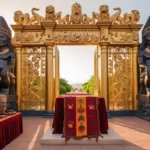Agrawau: Unveiling the Rich Heritage and Cultural Significance
Agrawau represents a vibrant tapestry of cultural heritage and community identity, deeply rooted in the history of the Agrawal community. Originating from the ancient city of Agroha, founded by King Agrasen, Agrawau embodies the values of ethical living, entrepreneurship, and social responsibility that have been passed down through generations. As we explore the rich traditions, rituals, and festivals associated with Agrawau, we gain insight into how this community has not only thrived economically but has also maintained a strong sense of belonging and cultural pride amidst the challenges of modernity.
Historical Origins of Agrawau
Agrawau’s origins can be traced back to Agroha, a city founded by King Agrasen, who is believed to have ruled during the time of the Mahabharata. Under his leadership, Agroha flourished as a center of trade and commerce, attracting merchants from various regions. The Agrawal community derives its name from this heritage; “Agra” refers to Agroha, while “wal” means people.King Agrasen’s teachings emphasized fairness, equality, and compassion—principles that have been passed down through generations. The Agrawals have upheld his legacy by thriving in business while focusing on ethical trade practices and contributing to social welfare.
The Role of Agrawau in Trade and Commerce
Historically, Agrawau families played a vital role in India’s trade and commerce. Their strong work ethic and commitment to ethical business practices made them natural leaders in the marketplace. During the medieval period, Agrawau traders were known for their expertise in handling goods such as textiles, spices, precious metals, and agricultural products.They established sophisticated trade networks that spanned from the Indian subcontinent to Central Asia and the Middle East. This positioned them as vital connectors in the intricate web of trade and cultural exchange among diverse civilizations.Their contributions significantly shaped India’s economic landscape.
Cultural and Religious Practices of Agrawau
The cultural identity of the Agrawal community is intricately tied to its values of hard work, integrity, and charity. Many Agrawals are followers of Jainism or Hinduism, which emphasizes non-violence, truthfulness, and ethical living. These spiritual beliefs have profoundly influenced their lifestyle and daily practices.
Festivals Celebrated by Agrawau

1. Agrasen Jayanti: This festival marks the birth of King Agrasen and is celebrated with great enthusiasm among the Agrawal community. It serves as a reminder of their rich heritage and commitment to upholding their ancestors’ values.
2. Diwali: Known as the Festival of Lights, Diwali is celebrated with family gatherings, prayers, and festive meals. The rituals focus on family unity and prosperity.
3. Maha Shivratri: This festival honors Lord Shiva with night-long vigils and prayers. Community members often gather at temples to participate in communal prayers.
4. Holi: The festival of colors is celebrated with vibrant festivities that include music, dance, and the throwing of colored powders. It promotes joy and inclusivity among community members.
5. Navratri: During this nine-night festival dedicated to Goddess Durga, traditional dances like Garba are performed. These events not only celebrate cultural heritage but also serve as a platform for community bonding.
Community Impact Beyond Weddings
Agrawau practices contribute significantly to community cohesion beyond just wedding ceremonies. The communal nature of festivals fosters unity among families and neighbors while reinforcing social ties.
Strengthening Community Bonds
Collective Celebrations: Festivals serve as communal gatherings where families come together to celebrate shared values and traditions.
Support Networks: During significant life events like births or deaths, community members provide assistance and emotional support to one another.
Cultural Education: Storytelling during festivals helps educate younger generations about their heritage, instilling pride in their identity.
Economic Contributions
Local Businesses: Many traditions involve local artisans and businesses during festivals and weddings, supporting local economies while preserving traditional crafts.
Philanthropic Initiatives: The Agrawal community is known for its charitable activities during festivals, contributing to local causes related to education and healthcare.
Cultural Contributions of Agrawau

The influence of Agrawau extends beyond commerce into art, literature, and religion. The community has been known for its patronage of cultural activities that contribute to the flourishing of arts and literature in regions where they settled.Many Agrawals maintain a strong connection to Jainism, which emphasizes ethical living and social responsibility. This connection influences their cultural practices—particularly their emphasis on ethical business dealings.
Challenges in Modern Times
Despite globalization’s challenges, the Agrawal community maintains its cultural identity through festivals and adherence to King Agrasen’s values. Celebrations like Agrasen Jayanti keep their heritage alive while community organizations ensure the continuation of philanthropic traditions.In contemporary society, many Agrawals thrive in various sectors—businesses ranging from traditional trading firms to modern tech startups—while remaining committed to their cultural roots.
Conclusion
Agrawau embodies a dynamic fusion of rich cultural traditions, principled entrepreneurship, and a deep commitment to social responsibility. From its roots in ancient India to its global presence today, it has left an indelible mark on history and culture. The legacy of Maharaja Agrasen serves as a reminder of the importance of ethical living and mutual support within communities.As the Agrawal community continues to thrive in the modern world, the influence of Agrawau will undoubtedly shape future generations through their contributions to business, culture, and philanthropy.
By upholding their rich heritage while adapting to contemporary challenges, they exemplify resilience—a testament to timeless values that unite communities across the globe. This blog post provides an extensive exploration of “Agrawau,” covering its historical origins, cultural significance, community impact beyond weddings, challenges faced in modern times, and more—all contributing to an engaging narrative that highlights this vibrant community’s rich heritage
Read also.
Minecraft (2009) Game Icons and Banners: A Comprehensive Guide to Customization and Creativity












